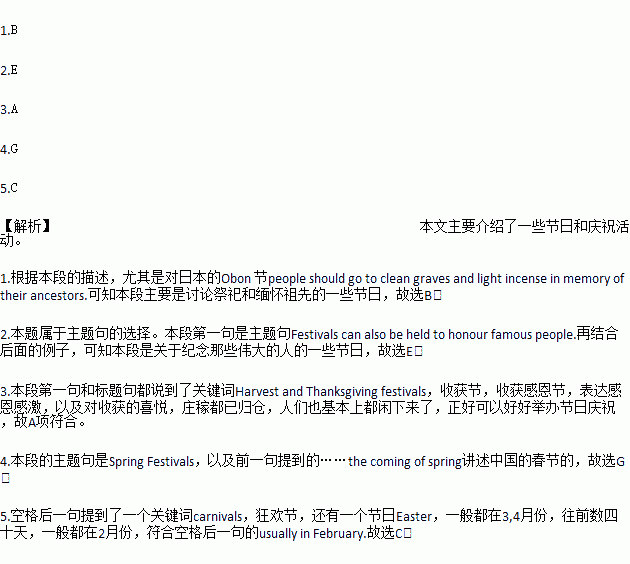题目内容
Festivals and celebrations
Festivals of the Dead
1., who might return either to help or to do harm. For the Japanese festival Obon, people should go to clean graves and light incense in memory of their ancestors. They also light lamps and play music because they think that this will lead the ancestors back to earth.
2.
Festivals can also be held to honour famous people. The Dragon Boat Festival in China honours the famous ancient poet, Qu Yuan. In the USA, Columbus Day is in memory of the arrival of Christopher Columbus in the New World. India has a national festival on October 2 to honour Mohandas Gandhi, the leader w ho helped gain India's independence from Britain.
ho helped gain India's independence from Britain.
Harvest Festivals
Harvest and Thanksgiving festivals can be very happy events.3. . In European countries, people will usually decorate churches and town halls with flowers and fruit, and will get together to have meals. Some people might win awards for their farm produce, like the biggest watermelon or the most handsome rooster. China and Japan have mid-autumn festivals, when people admire the moon and in China, enjoy mooncakes.
Spring Festivals
The most energetic and important festivals are the ones that look forward to the end of winter and to the coming of spring.4. , fish and meat and may give children lucky money in red paper. There are dragon dances and carnivals, and families celebrate the Lunar New Year together. 5., usually in February. These carnivals might include parades, dancing in the streets day and night, loud music and colourful clothing of all kinds. Easter is an important religious and social festival for Christians around the world. It celebrates the return of Jesus from the dead and the coming of spring and new life.
People love to get together to eat, drink and have fun with each other. Festivals let us enjoy life, be proud of our customs and forget our work for a little while.
A. People are grateful because their food is gathered for the winter and the agricultural work is over.
B. Some festivals are held to honour the dead or to satisfy the ancestors.
C. Some Western countries have very ex citing carnivals, which take place forty days before Easter
citing carnivals, which take place forty days before Easter
D. Festivals are meant to celebrate important times of year.
E. Festivals to Honour People
F. Different countries have different festivals.
G. At the Spring Festival in China, people eat dumplings


 d marketing has effects that go beyond simply increasing our liking or wanting of the product being advertised and actually affect our preferences for all foods in that category,” said Emma Boyland of the University of Liverpool.
d marketing has effects that go beyond simply increasing our liking or wanting of the product being advertised and actually affect our preferences for all foods in that category,” said Emma Boyland of the University of Liverpool.